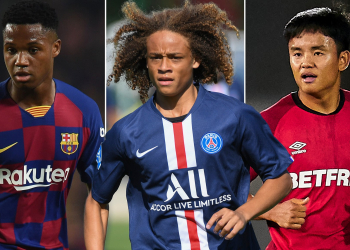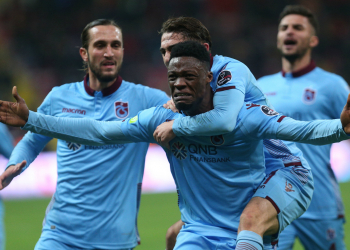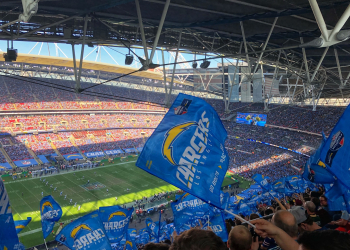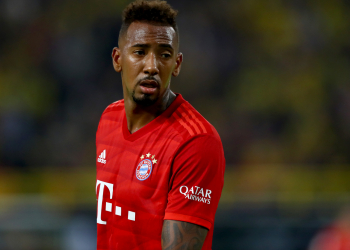The Ghanaian was a global phenomenon in the early 1990s but tragically failed to fulfil his potential. So what became of the man tipped for greatness?
‘The new Pele’. It is a tag that should inspire any young footballer to greatness but over the years it has only served to burden, even curse, those labelled with the moniker.
Edu, Robinho and Freddy Adu are just a few of the anointed ones who – to varying degrees – failed to fulfil their potential, but none of these saw their careers, lives and families devastated like the most infamous ‘new Pele’ of them all: Nii Odartey Lamptey.
Lamptey burst onto the scene as a 14-year-old at the 1989 FIFA U-16 World Championship in Scotland. After a brilliant performance in the opening game against the hosts at Hampden Park, the attending Pele hailed the tricky and explosive midfielder as his natural successor.
Two years later at the Under-17 version of the tournament in Italy, Lamptey became a global phenomenon. He outshone the likes of Alessandro Del Piero and Juan Sebastian Veron to lead Ghana to the title, winning the Golden Ball and scoring four goals in the process – including a stunning strike over favourites Brazil in the quarter-finals.
He was smuggled out of his homeland on a fake passport posing as the son of Nigeria captain Stephen Keshi so that he could sign for the defender’s club Anderlecht as a 15-year-old. Such was his God-given talent that age limit rules in Belgium were changed so that Lamptey could debut for the club at 16 – the same age at which he became a regular for his country’s senior side.
Lamptey lit up the Belgian league, scoring seven goals in 14 games in his first campaign alone, while he also enjoyed an exceptional loan spell at PSV, striking 10 times in 22 games. All this while still a teenager and continuing to star in various international tournaments – including the Barcelona Olympics and Africa Cup of Nations of 1992 in which Ghana claimed bronze and silver, respectively.
But then things started to go wrong. A big-money move to the English Premier League in 1994 was a disaster, as Lamptey flopped at both Aston Villa and Coventry City – and he would never recover. In the space of the next 14 years until his retirement at the age of just 33, the midfielder would play for 11 clubs in 10 countries spanning four continents. His final game for Ghana came at just 21.
There have been numerous theories as to why Lamptey went into freefall. The most common is that the pressure of being the next Pele was too much to handle. “The expectations on me were very, very huge,” he told The Observer in 2008.
Lamptey had endured a very difficult upbringing. Both of his parents abused him. His alcoholic father – who later disowned him after Nii converted to Islam – beat and burned him with cigarettes. “I still have the marks on my body,” he recalled. With no education and no support network, Lamptey had no-one to turn to during difficult times.
His inability to read or write meant that he was exploited mercilessly by greedy and manipulative money-men, particularly the infamous Italian agent Antonio Caliendo, who deceived the Ghanaian out of his rightful earnings. “I was cheated so much,” said Lamptey. “I didn’t even know I had a right to a signing-on fee. The Aston Villa manager, Ron Atkinson, told me, and in the club office they gave it straight to me.
“Two weeks later, my agent came over and I think he went to the club to get the money. They said they had given it to the player. He was very upset with me. There were so many people cheating me, just looking after their own interests.”
Lamptey was also overplayed while his body was still developing, with Ghana insisting that he represent all of the nation’s youth’s teams concurrently. By the time he hit his twenties, the midfielder was suffering from burnout and constant injury problems.
Then there was the personal tragedy which would have negatively impacted any person’s professional career. Lamptey tragically lost two of his children, Diego (named after Maradona) and Lisa, to a rare lung disease. Understandably, he sometimes even wonders if he was cursed: “They say there is all this Juju in football.”
Given the grim nature of his life, it would be totally understandable if the now 42-year-old Lamptey now spent his life sitting around feeling sorry for himself – even more so following the bitter and public divorce from his wife Gloria in 2013 that revealed that their three surviving children were not Nii’s biologically.
However, since retiring from playing in 2008, Lamptey remains a positive soul who should feel very proud about what he has since achieved. Indeed, he founded the Glow-Lamp International School in Accra – which has over 400 pupils – in an attempt to give children the opportunities he didn’t have growing up.
“Education is very important. Education was a big problem for me,” he said, fighting back the tears during an interview with Futbol Mundial in 2014. “I didn’t have time to go to school. I lost so many things. I couldn’t read or write. Knowing the pain I went through at that time, I don’t want kids to go through that.”
Fittingly, every classroom at Glow-Lamp is named after a country that he played in during his well-travelled career. He also spends time coaching youngsters at his academy in Elmina, where, in addition to passing on all his footballing expertise, he tries to prepare aspiring footballers for the mental challenges that he himself struggled to overcome.
Lamptey has also passed on his wisdom and knowledge as a football pundit on Ghanaian television, working as a studio analyst for TV3 during the 2014 World Cup alongside former Bayern Munich and Ghana defender Sammy Kuffour. The busy man that he is, Lamptey owns and runs a farm on the outskirts of Accra – breeding cattle and sheep.
He has even recently experienced some much deserved happiness in his personal life. Last August, Lamptey and his fiancée Ruweida Yakubu, an actress and model, welcomed their second child into the world.
Lamptey has endured a rollercoaster life. His career serves as an example of everything that can go wrong for a young footballer and why caution should be exercised when building up teenage talent.
However, the 1991 FIFA World Youth Championship hero has emerged from the darkness and one hopes that there are only more good times ahead.
“Even if I say I’m a failure in football, God wouldn’t punish me,” he reasons. “I have been through hell. But I enjoy my life now, I can take care of my family. I am okay.”
Join GhanaStar.com to receive daily email alerts of breaking news in Ghana. GhanaStar.com is your source for all Ghana News. Get the latest Ghana news, breaking news, sports, politics, entertainment and more about Ghana, Africa and beyond.




